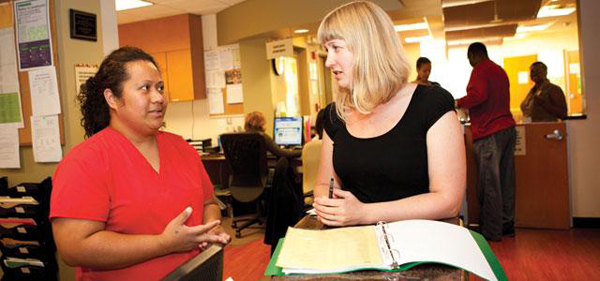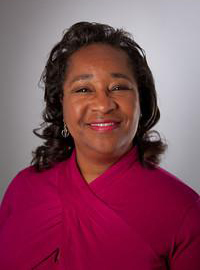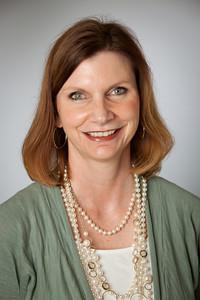Nursing School Teaches New Master's Curriculum to Provide Patient-Centered Care
Education Draws on Evidence-Based Needs for Advanced Practice Nurses

At Glide Health Services, UCSF student Adrienne Franzese meets with medical assistant Sosefina Tagalu. Photo by Elisabeth Fall
When Adrienne Franzese started her master’s degree studies at UCSF School of Nursing, she wanted to learn how to help people with mental illness cope with chronic pain.
Her interest grew during her first year of residency at Glide Health Services, a UCSF nurse practitioner-managed clinic in San Francisco’s tough Tenderloin neighborhood. As with the other 116 million Americans with chronic pain, the nearly 50 patients in Glide’s pain management program can’t rely on opioids as a permanent solution to end suffering. The drugs may lose their effectiveness as patients build tolerance. Addiction is a risk.
Plus, Glide’s patients present unique challenges. Many are poor, some are homeless, and they often have other health issues, including mental illness. Glide’s clinicians need to know as much as they can about a patient’s life outside the clinic, so that they can design an effective pain management plan. With that knowledge, they will typically employ a multimodal approach to pain management: medication plus non-pharmaceutical interventions such as physical therapy, stress reduction, support groups and counseling.
A new, two-quarter project planning course in the School of Nursing, Evidence-Based Practice for Advanced Practice Nurses, is giving Franzese the opportunity to test an idea to improve care. Her project exemplifies the goals of the newly revised master’s curriculum at the School of Nursing.
Updated Curriculum Draws on Evidence-Based Needs
Franzese’s class is one of several that the nursing school introduced last fall as part of an initiative to update the curriculum for master of science (MS) students. The purpose of the revision, led by a task force that included faculty, students and administrators, is to develop and implement an effective and efficient curriculum for future master’s-prepared students, so that they can provide high-quality, patient-centered care.
The curriculum revision takes place against a backdrop of major shifts in health care. Skyrocketing costs have forced the medical profession to pay greater attention to prevention and community-based care, often among diverse populations. Economics puts pressure on practitioners to watch the bottom line and employ methods that are proven to be efficient, beneficial and cost-effective.
Meanwhile, doctors continue to specialize, leaving nurses with growing responsibility for providing primary care, according to a 2010 report by the committee of the Robert Wood Johnson Foundation Initiative on the Future of Nursing at the Institute of Medicine.
When Adrienne Franzese started her master’s degree studies at UCSF School of Nursing, she wanted to learn how to help people with mental illness cope with chronic pain.
Her interest grew during her first year of residency at Glide Health Services, a UCSF nurse practitioner-managed clinic in San Francisco’s tough Tenderloin neighborhood. As with the other 116 million Americans with chronic pain, the nearly 50 patients in Glide’s pain management program can’t rely on opioids as a permanent solution to end suffering. The drugs may lose their effectiveness as patients build tolerance. Addiction is a risk.

Judy Martin-Holland
Plus, Glide’s patients present unique challenges. Many are poor, some are homeless, and they often have other health issues, including mental illness. Glide’s clinicians need to know as much as they can about a patient’s life outside the clinic, so that they can design an effective pain management plan. With that knowledge, they will typically employ a multimodal approach to pain management: medication plus non-pharmaceutical interventions such as physical therapy, stress reduction, support groups and counseling.
A new, two-quarter project planning course in the School of Nursing, Evidence-Based Practice for Advanced Practice Nurses, is giving Franzese the opportunity to test an idea to improve care. Her project exemplifies the goals of the newly revised master’s curriculum at the School of Nursing.
Updated Curriculum Draws on Evidence-Based Needs
Franzese’s class is one of several that the School introduced last fall as part of an initiative to update the curriculum for master of science (MS) students. The purpose of the revision, led by a task force that included faculty, students and administrators, is to develop and implement an effective and efficient curriculum for future master’s-prepared students, so that they can provide high-quality, patient-centered care.
The curriculum revision takes place against a backdrop of major shifts in health care. Skyrocketing costs have forced the medical profession to pay greater attention to prevention and community-based care, often among diverse populations. Economics puts pressure on practitioners to watch the bottom line and employ methods that are proven to be efficient, beneficial and cost-effective.
Meanwhile, doctors continue to specialize, leaving nurses with growing responsibility for providing primary care, according to a 2010 report by the committee of the Robert Wood Johnson Foundation Initiative on the Future of Nursing at the Institute of Medicine.

Lynda Mackin
“Nurses need a much broader sense of seeing how the systems work to get patients’ needs met,” says Judy Martin-Holland, the school’s associate dean for academic programs and diversity initiatives. “It’s broader than just diagnosing or treating or learning a certain set of tricks to keep in the game. It’s really taking more of a leadership role in assessing patient needs, and advocating for patients and improving care.”
The task force began its revisions in 2008 by studying other nursing programs and reports from various accrediting bodies. The new curriculum also reflects much of what is being promoted by professional organizations, including a report by the Carnegie Foundation for the Advancement of Teaching that was co-authored by Patricia Benner, a professor emerita in the School of Nursing.
Additionally, elements of the Institute of Medicine’s “Future of Nursing” report supported the case for change, particularly for faculty members who were initially hesitant, says Lynda Mackin, an associate clinical professor in the Department of Physiological Nursing.
To read the entire story, go to the UCSF School of Nursing's Science of Caring website.